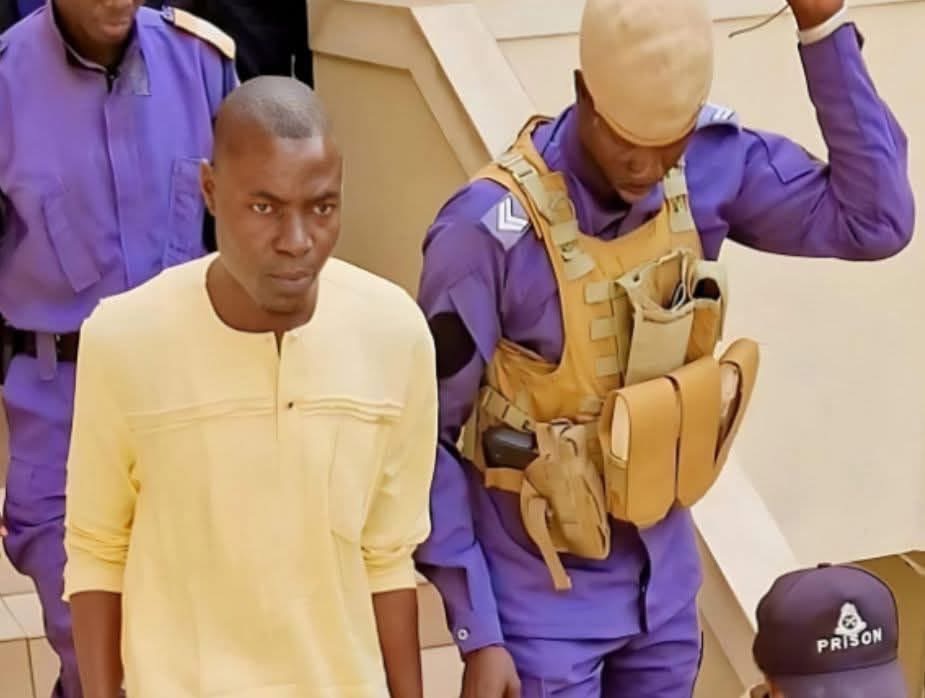
Ousainou Bojang in court
In the ongoing trial of Ousainou Bojang and Amie Bojang, a procedural dispute arose regarding the prosecution’s request to introduce testimony from a cobbler to examine the size of the shoes of Ousainou Bojang and the shoe of his brother, which had already been admitted as evidence.
The Director of Public Prosecution (DPP), A.M. Yusuf, appeared for the state, while Senior Counsel Lamin J. Darboe represented the first accused, Ousainou Bojang, holding brief for Senior Lawyer Lamin K. Mboge, who represents Amie Bojang.
The case resumed with the continuation of Ousainou Bojang’s cross-examination by the DPP. Before the cross-examination could proceed, DPP Yusuf informed the presiding judge, Justice Jaiteh, of his intention to call a cobbler to examine the size of the shoes that had already been tendered as evidence.
Senior Counsel Darboe objected to the request, arguing that the procedure was irregular and did not align with established court procedures. He pointed out that the shoes had already been accepted as evidence, with one clearly belonging to the accused and the other not. Darboe also noted that the DPP had failed to inform the defense of his intention to introduce the cobbler, which had prevented the defense from preparing adequately on the matter.
In his justification, DPP Yusuf stated that the defense had previously brought a mobile expert to examine a mobile phone and argued that the cobbler was not being introduced as a witness to testify but merely to examine the physical size of the shoes. He urged the court to allow the examination, suggesting it would aid in the case.
Counsel Darboe countered that the application was procedurally flawed and should be dismissed. He reminded the court that the DPP had already used a tape measure to assess the shoe sizes and proposed that the prosecution continue with this method.
Despite this, DPP Yusuf persisted, insisting that the cobbler possessed a specific method to accurately determine the shoe size, using a mold that could be inserted into the shoes to indicate the size.
He further attempted to draw a parallel with the defense’s previous application to invite a mobile technician to unlock the first accused’s phone. Following a heated exchange, the court deferred its ruling.
In his decision, Justice Jaiteh emphasized the importance of adhering to established criminal procedure. He expressed concerns that allowing the cobbler’s testimony during the ongoing cross-examination of the first accused would raise procedural and ethical issues.
“Allowing such testimony during the Defence stage of the trial creates an imbalance and undermines the integrity of the process. The Defence is entitled to present its case without the undue influence or interruption of ongoing prosecutions, particularly when the prosecution has already concluded its case.” Justice Jaiteh stated.
The judge further explained that introducing the cobbler’s testimony at this stage could be seen as an attempt by the prosecution to introduce new evidence while the accused was under cross-examination. He deemed this practice inappropriate and contrary to the principles of criminal procedure, which require a structured presentation of evidence to ensure fairness.
Justice Jaiteh distinguished the prosecution’s request from the defense’s earlier application to introduce a mobile expert, noting that the context of examining a locked phone, directly relevant to the case at hand, was fundamentally different from examining shoe measurements that had already been admitted into evidence as Exhibit P26.
The judge stressed that granting the prosecution’s request could result in procedural impropriety and warned that deviations, especially during critical stages like cross-examination, could compromise the fairness of the trial and infringe on the rights of the accused.
“In light of the above considerations, the request to invite the cobbler to testify at this time is not permissible in its current form,” Justice Jaiteh ruled.
He advised the prosecution that if they wished to pursue the matter further, they should file a formal application supported by relevant legal provisions, explaining their justification for such testimony in a manner consistent with established criminal procedure. This would allow the court to properly evaluate the request and ensure that all parties have an equal opportunity to respond.
Justice Jaiteh concluded by reiterating the importance of adhering to procedural rules, which safeguard the integrity of judicial proceedings and protect the rights of the accused.
As a result of the ruling, the cross-examination of Ousainou Bojang will continue without the introduction of the cobbler’s testimony unless the prosecution files a formal application in accordance with the court’s guidance.
